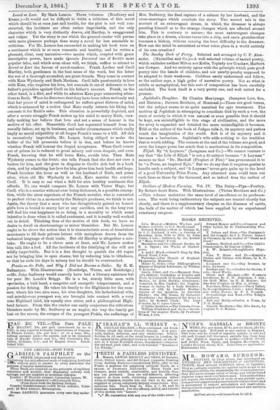Loved at Last. By Mark Lemon. Three volumes. (Bradbury and
Evans.)—It would not be difficult to write a criticism of this novel which should be at once just ana hostile, for the plot is not well con- structed, the incidents are often rather improbable, and the only character which is very distinctly drawn, old Hartley, is exaggerated and vulgar. Yet the story is one which the general reader will peruse with more pleasure perhaps than many a novel far less amenable to criticism. For Mr. Lemon has succeeded in making his book turn on a sentiment which is at once romantic and healthy, and be writes a pleasant, clear, easy narrative—two merits which, coupled with great descriptive power, have made Quentin Durward one of Scott's most popular tales, and which even alone will, we think, suffice to attract to Loved at Last the favour of novel-readers.. Frank Locker and Cecil • Hartley, both gentlemen in the best sense of the word, but the latter the son of a thorough scoundrel, are great friends. They come in contact with Kate Wycherly and Ruth Masham. Cecil falls passionately in love with Kate, who requites his love, but conceals it out of deference to her father's prejudice against Cecil on his father's account. Frank, on the other hand, is a flirt, and while he admires Kate pays unmeaning atten- tions to Ruth. When he discovers that they have been taken seriously and that her peace of mind is endangered he suffers great distress of mind, which is enhanced by a notion that Kate really returns his liking but conceals it for Ruth's sake. This situation is powerfully depicted, and after a severe struggle Frank makes up his mind to marry Ruth, care- fully making her believe that love and not a sense of honour is the motive of his offer. Meanwhile Cecil has separated himself from his rascally father, set up in business, and under circumstances which really imply no moral culpability at all forges Frank's name to a bill. All this is excessively improbable, Mr. Lemon being obliged to make the holder of the bill prosecute before it is due, and before he knows whether Frank will honour the forged acceptance. When Cecil comes oat of prison he is reduced to groat misery and even despair, and even Frank, knowing that he still loves Kate, avoids him. Than Kate Wycherly comes to the front ; she tells Frank that she does not care a button for him, and she goes in disguise to Cecil's sick bed in a back slum, and by admitting her love for him gives him back health and hope. Frank becomes the lover as well as the husband of Ruth, and years after, when old Mr. Wycherly is dead, Kate marries the convict Cecil. It is easy to see what a field for nice healthy sentiment this affords.. No one would compare Mr. Lemon with Victor Hugo, but Cecil, who is a convict without ever being dishonest, is a possible concep- tion, while the utter reprobate of the French novelist, who is converted to perfect virtue in a momentby the Bishop's goodness, we think is not. Again, the theory that a man who has thoughtlessly gained an honest girl's love is bound to marry her at any sacrifice, and in the long ran will find his own happiness in so doing, is a morality to which some injustice is done when it is called sentiment, and it is really well worked out in detail. Thinking thus of the motive of this book, we have no desire to dwell on shortcomings or minor blemishes. But Mr. Lemon ought to be above the notion that it is characteristic even of fraudulent merchants to fill their private letters with metaphors drawn from the technical language of their trade. But old Hartley is altogether a mis- take. He ought to be a clever man at least, and Mr. Lemon makes him talk like a fool. All the incidents of the falsifying of the will are wildly improbable. But it is a fine thought to punish the old rogue not by bringing him to open shame, but by reducing him to blindness, so that he ends his days in misery lest he should be overreached.






























 Previous page
Previous page